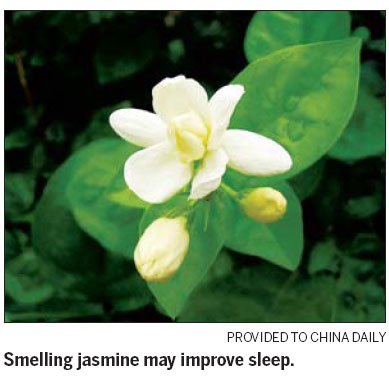Flower power can help you snooze
A nose full of jasmine is just as effective as a sleeping pill or a valium in calming your nerves and helping you to get restful sleep, according to a team of German researchers.
Showing that nature is more powerful than drugs, the essence from Gardenia jasminoides has been proven to contain the same molecular mechanism of action and is as strong as the commonly prescribed barbiturates or propofol. They soothe, relieve anxiety and promote sleep.

The researchers have been granted a patent for their discovery. They report in the current online issue of the Journal of Biological Chemistry.
In pioneering research done in cooperation with Dr Olga Sergeeva and Professor Helmut Hass from the Heinrich Heine University in Dusseldorf, researchers from Ruhr-University Bochum (RUB), led by Professor Hanns Hatt, have discovered that the two fragrances vertacetal-coeur (VC) and the chemical variation (PI24513) have the same molecular mechanism of action and are as strong as the commonly prescribed barbiturates or propofol.
Sedatives, sleeping pills and relaxants are the most frequently prescribed psychotropic drugs. Some 20 percent of people in Western countries take sedatives on an occasional basis, if not regularly.
The difference between calming and hypnotic effect depends solely on the dosage. The classes of substances that exert a calming effect include alcohol, barbiturates and opiates, and, since the 1950s, the benzodiazepines, now among the world's most widely prescribed drugs.
However, benzodiazepines are not only potentially addictive but can also cause serious side effects, such as depression, dizziness, hypotension, muscle weakness and impaired coordination.
The researchers performed a large screening study in which they tested hundreds of fragrances to determine their effects on human and mice receptors.
The two fragrances vertacetal-coeur (VC) and the chemical variation (PI24513) were the strongest. They were able to increase the effect by more than five times and thus act as strongly as the known drugs.
The "crosscheck" with genetically modified GABA receptors in transgenic mice, which no longer responded to propofol, confirmed that the mechanism of action is the same. The altered receptor also no longer responded to the fragrances.
Behavioral tests with mice in Professor Herrmann Luebbert's laboratory in the department of animal physiology at the RUB then eliminated the last doubts concerning the qualities of fragrance as a sedative.
Injected or inhaled, the fragrances generated a calming effect. In a Plexiglas cage, the air of which contained a high concentration of the fragrance, the mice ceased all activity and sat quietly in the corner.
Via the air breathed in, the scent molecules go from the lungs into the blood and then are transmitted from there to the brain. Electrophysiological measurements of neurons in the brain areas responsible for the sleep-wake cycle showed the effect on those nerve cells active in sleep was enhanced by the fragrances.
"We have discovered a new class of receptor modulator, which can be administered parentally and through the respiratory air," Professor Hatt says.
"Applications in sedation, anxiety-, excitement- and aggression-relieving treatment and sleep induction therapy are all imaginable. The results can also be seen as evidence of a scientific basis for aromatherapy."
By changing the chemical structure of the scent molecules, the researchers hope to achieve even stronger effects.
 0
0 







Go to Forum >>0 Comments